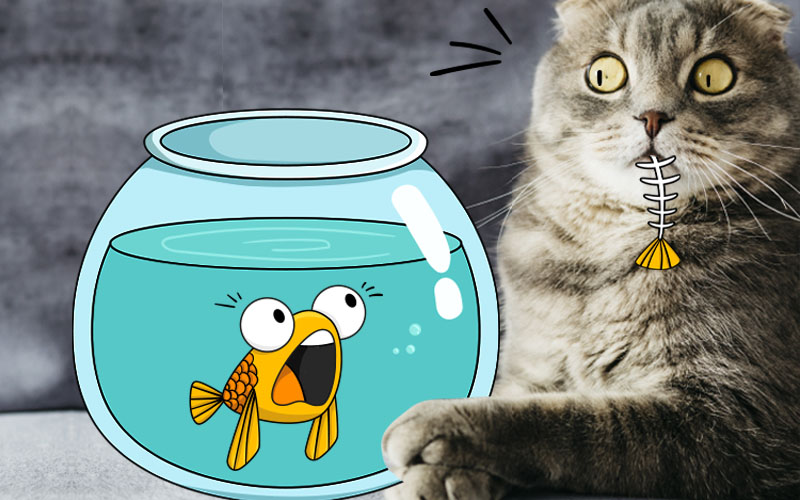Cats are more sensitive than dogs and have sharper minds, even though they show emotions of their favorite humans seldom. We all love cats for their extremely innocent features yet haughty personas. We all know cats love themselves, and they would never compromise on their peace of mind for literally anything.
Being a cat lover, you also lie in a different zone of humans, because most of the people prefer getting love from animals rather than offering them with all the love.
All cat owners prefer to have cats than dogs because, for them, self-praise and love are more important than their pets.

As you are here, searching for foods to feed your cat, that’s commendable.
Your love for cats is unmatched, so without wasting time, here are short notes on tuna fishes and cat food.
Cats love to eat all types of fishes, including tuna. However, cats want you to feed them with tunas, tunas, and tunas all the time no matter what, so your research regarding Can Cats Overeat Tuna is right.
When feeding cats, various types of questions occur in our minds, such as:
- Can Cats Eat Tuna?
- Is Tuna harmful to my cat?
- how much tuna can cats eat?
- can cats eat canned tuna
- can cats eat tuna in oil
- can cats eat tuna in Springwater
To get answers to all the questions regarding best cat food options, i.e., Tuna Fish; here is a detailed discussion cherished with pros & cons:

Cats love fishes, and when it comes to tunas, it can just make your kitty crazily dangling around the dish, pot, or place oozing with the aroma of fish-meat. Due to such wilderness of cats for fish-mixed and pure fish flavors, owners try to feed them with their this very favorite food.
However, in the long run, Tuna-embedded lunches and dinners start to show lousy health signs in innocent kitties. And instantly, a thought crosses our minds: Is tuna bad for cats?
Table of Contents
Is Tuna Bad for Cats?
Well, fish itself is not bad for cats; however, various factors make it so such as:
You are maybe feeding too much of it.
Despite your cat’s love for seafood, too much quantity is disturbing her overall health.
Secondly, you may be choosing the wrong way or form of fishes to feed your cat.
Feeding raw tuna to cats, for a long time, will not meet the nutrition-requirement of the kitty and will harm the overall strength of the pet.
Ans: Some people try to feed tunas topped with miracle whip. This is wrong. Cats cannot eat miracle whip.
There is no doubt that Seafood, including Tuna, is an excellent source of protein, but it is nutritionally incomplete for your cat. Your cat requires vitamins, minerals, and the amino acid taurine to grow prosperous. Therefore, relying on only raw tuna is bad. To know what is best to feed to your cat to avoid tuna cravings, ask the professional vet or purchase high-quality protein-enriched cat food.
Thirdly, you maybe don’t know about the allergens and sensitivities of your kitty.
Many cats with or without respective to breeds are allergic or sensitive to seafood.
If you fed an allergen food to your pet, the lousy health signs would start to show up early.
Fourth, your cat may not have reached the age of an adult that can digest tuna food.
Ans: Feeding tuna to a tiny kitten, aging between 3 to 12 months, is not useful and beneficial as they need excessive nourishment to grow healthy.
Why Cats Shouldn’t eat Tuna – Cons of Feeding Tuna to your kitties:
Here are some disadvantages of feeding tuna to your small or adult cats:
Tuna Contains Mercury:

Many fishes, including tuna and shellfish, contain methylmercury in their bodies. It is a highly toxic organomercury compound entered in the bodies of fishes due to living and swimming in metal-rich pollutant water. Feeding your kitties with such cats with such toxic rich food is called as mercury poisoning, can harm your cat’s:
- muscle growth
- cognitive ability
- mental ability
Tuna Leads Cat to Develop Steatitis:

Steatitis is a rare disease related to the physical health of cats in which lumps under the skin surface starts to occur in the pets. It happens due to the inflammation of the fatty tissues in the cats. However, it happens because fishes, specifically tunas, are lacking a lot of vitamins, specifically, vitamin E., This lower intake of vitamin E, leads to:
- Inflammation of fatty cells
- Chubbiness
- Hard time to move
Tunas Are Embedded with Unsaturated Fats:

We all know excess fats are harmful not just for pets but for everyone. However, in cats, they can be the reason for serious health issues. Therefore, as Tunas are full of unsaturated fats, the continuous intake can cause:
- Severe fatty degeneration of the liver
- hyperkeratosis in the skin
- fat in the kidneys
- testes’ degeneration
- adrenal glands’ dystrophic mineralization
Increase in The Production of Thiaminase:

Thiaminase, famously known as Vitamin B1, its production in the cat’s body increases due to more intake of fish food. This increment in the production causes various health harms in the bodies of your innocent and loving toms. Such as:
- weaker immune system
- less defense against Thiaminase
- less defense against common diseases developments
Poor Body Control:

Along with lacking so many necessary vitamins, mostly seafood also lacks in vitamin B, 12, and 6 as well as vitamin C. The signs of poor control, start to occur more frequently when cats age such as:
- Seizure, (sudden electrical disbalance in the cat’s brain)
- Poor body control (they feel hungry, frequently than before)
Disadvantages or cons cannot be attached with tunas, serving your cat with tuna treats sometimes is required for sure. You know that nothing in this world is filled with only cons.
Here is how and why cats can eat tuna.
How and Why Can Cats Eat Tuna
Keeping your cats away from their favorite food entirely is not a good idea. Cats are intelligent animals, sometimes smarter than dogs, and they never want to compromise on their sole food and taste.
When you want your cats to eat tuna, it is better that:
- You keep in mind the daily nutrition intake requirement
- You keep in mind the texture and form of the fish you are feeding, such as canned tuna, tuna in oil, in brine, and Springwater, etc.
- Understand about your cat’s triggering allergens and consult the vet before you design a good meal for your cat.
Do not feed your cat frequently with tuna meals; however, do it when you see that your cat has acted upon your instruction. By doing so, you can develop your intelligent cat’s mind with the fact that he or she is only going to get their favorite meal in reward, if, listens to you and your instructions.
While offering a treat, let your cat feel like a celebrity.
The best time to feed your cat with Tuna Treats:
Cats can develop imbalanced and hard-to-understand behaviors sometimes such as Clingy Cat disorder. Most of the time, people try to help their clingy cats by booking psychiatrists’ appointment. However, this should be the last option because some alternative changes in the overall routine and teaching your cats some manners can definitely help your Clingy Cat.
The best time to treat your cat with Tuna is when she will hear what you say and will show less clingy behavior.
Now, to the answers of some of the Frequently asked questions from our experts.
FAQs – Can Cats Eat Tuna:

Can Cats Eat Tuna?
Yes, your cats can definitely enjoy tuna meals; however, in a moderate quantity and only occasionally. Complete dependence on seafood can surely harm your cat’s health in the long and short run.
Is Tuna harmful to my cat?
Tuna itself is not harmful to pets, specifically cats; however, it can show destructive problems in health and attitude when fed continually. Cats can develop chronic issues of health in the brain and physique due to tuna food.
How much tuna can cats eat?
Your cat requires not just vitamins but a moderate and reasonable quantity of proteins as well, and Tuna Fish is the rich source of proteins. Now, while designing your cat’s meal, you can fulfill protein intake by simply adding some good portions of seas food in it.
However, it is better that you seldom feed your cat with fishes, as a treat for some of their excellent behavior.
What sort of Tuna fish is best to feed my cat such as;
When it comes to feeding your cat with tuna fishes, there are many forms you get, such as canned tuna (human food), tuna in oil or juice of tuna, as well as, tuna in Springwater. Here is the answer to your queries:
can cats eat canned tuna?
Well, this is not a good option because canned tunas are specifically designed for humans and they are moderately precooked. Rather than going with the canned option, it is better that you adopt tuna food that’s dedicatedly made for cats.
can cats eat tuna in oil?
Once again, this is bad because oils are rich in fats, and tuna itself is rich in unsaturated fats. Therefore, if you wish to give your cat a treat, make sure tunas are dipped in their natural juice. It would be less harmful, and when fed seldom, it won’t be harmful at all.
Can cats eat tuna in Springwater?
Yes! Cats can eat tuna in Springwater, but once again, you should not only rely on it completely. Just keep it as a treat meal for your cat.

